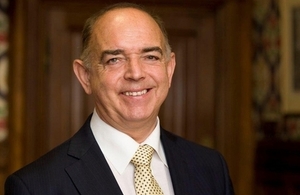Troubled Families Programme: transforming the lives of thousands of families
Op-ed by Communities Minister, Lord Bourne.

When the Prime Minister entered Number 10 in July she talked about the many families who are only just managing to get by.
In the course of my ministerial work, I often meet these sorts of families. One mother I recently met had been in an abusive relationship and was in a lot of debt; her son, as a result of events at home, had been skipping school.
Another mother I spoke to had mental health problems, all of which was making it hard for her to cope with her 3 small children.
A single father I met had to give up work because of his son’s autism and challenging behaviour, behaviour so bad that his daughter’s schooling had been affected.
It is families like these which the government’s Troubled Families Programme has been supporting over the past 4 years: families who are struggling to cope with everything life has thrown at them, and sometimes causing more problems as a result.
When it was launched in 2012, the programme was the first national and systematic attempt to help families with multiple problems to improve their lives. In the past, those families had been failed by public services which didn’t work together and only dealt with one problem of one member of the household.
For example, Jobcentre staff did not spot or deal with signs of depression and domestic abuse when, in fact, it was these problems which meant a mother did not have the confidence to get a job.
In contrast, the Troubled Families Programme sought to help a whole family with all of its problems, using a keyworker as one point of contact to help a family get back on its feet and move forward.
We know that more than 116,000 of the families who participated in the first phase of the programme have seen significant improvements in their lives, with children back in school for a year, reduced youth crime and anti-social behaviour, and adults holding down a job.
We also know the programme transformed the way services responded to the most complex families. Different agencies – the police, NHS, social services, employment advisers – worked together to help the family instead of pushing them from pillar to post.
And because these troubled families put some of the highest costs on the public purse – often tens of thousands of pounds per year – we are confident that the programme will save money for the taxpayer too.
The programme has been hugely popular with the councils who run it in local areas – all 150 of them signing up for the second phase. And we know that families on the programme really value the programme’s approach.
When I asked just one of the families how the programme had improved their lives, they said: “Before I started on the programme my life was miserable and difficult, the one word I would now use to describe my life is ‘happy’.” Another described their keyworker as a “guardian angel”.
Of course, there will always be lessons to learn. As a pioneering programme, working with complex families in this way and on this scale for the first time, we never expected to get everything right and have never claimed to have done so.
We believe this programme has transformed the lives of thousands of families. The councils and frontline staff who have put it into practice should be pleased with the work they have done.
And, most of all, the families should be proud of having had the courage and commitment to change their lives for the better. They valued the programme because for them it worked.
So we will not turn our backs on these families. We will continue to help and support even more families who are just about managing, or not managing at all, as we build a Britain that works for everybody and not just the privileged few.